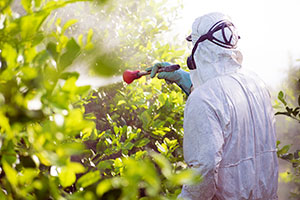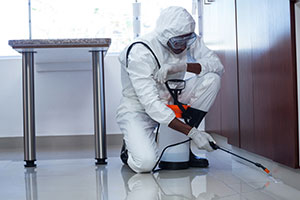
Busting Myths: What Actually Works in Home Pest Control
Like a detective on a mission, you're determined to crack the case of home pest control. You've heard the tales, seen the homemade remedies, but what really works? Let's bust some myths together and unveil the truth about keeping those pesky invaders at bay.
In this journey, you'll discover what's effective, what's not, and how you can reclaim your home in the battle against pests.
Welcome to your guide to no-nonsense, reality-based pest control.
Understanding Common Home Pests
Before diving into effective pest control methods, it's crucial for you to have a solid understanding of the common pests in and around your home. Knowledge is power, my friend, and here we're all about empowering each other to create safer, more comfortable living spaces. Get ready to become a home pest expert!
Let's start with the usual suspects. Ants, cockroaches, and rodents are common intruders. Ants are attracted to food, water, and shelter. They're a nuisance, but they can also contaminate food. Cockroaches, those unsightly critters, can carry diseases and trigger allergies. Rodents, like mice and rats, cause damage to your home by gnawing on anything they can get their tiny paws on, including electrical wires, which can lead to fires.
Flying insects, like flies and mosquitoes, are also frequent uninvited guests. Flies are notorious for spreading diseases, while mosquitoes can transmit serious illnesses like Zika and West Nile viruses.
Then there's the group of pests that can cause structural damage to your home. Termites and carpenter ants fall into this category. If left unchecked, they can literally eat your house out from under you.
In our community here, we don't just seek to eliminate pests, but also to understand them. By knowing what attracts these pests to our homes, we can take the necessary preventive measures. Remember, a well-informed homeowner is a powerful homeowner. Together, we can make our homes pest-free zones.
Now that you're armed with knowledge, let's move on to busting those pest control myths. You're part of the team now, so let's get to work!
Debunking Popular Pest Control Myths
Now that we've identified the common culprits, let's tackle a few widespread pest control myths that you might've heard. You're part of our community now, and we want you to feel confident, informed and equipped to protect your home.
The first myth we often hear is that cheese is the best bait for mouse traps. The truth is, these little critters are more attracted to foods high in sugar or protein, like peanut butter or chocolate. So, next time you're setting a trap, remember to swap out the cheddar for something sweeter.
Another common myth is that pests only infest dirty homes. This is just not true. Pests aren't picky; they're just looking for food, water, and shelter. Both clean and dirty homes can provide these essentials. Don't beat yourself up over a few bugs; it doesn't necessarily reflect on your housekeeping skills.
Finally, you may have heard that ultrasonic repellents are the magic bullet for all pests. Unfortunately, studies show these devices aren't as effective as promised. They might deter some pests initially, but most will eventually return. Your best bet is to stick with proven methods like traps, pesticides, or professional pest control services.
In busting these myths, we hope to empower you to take effective action against pesky invaders in your home. Remember, you're not alone in this fight! Our community is here to support and guide you every step of the way. So here's to a pest-free home, and the peace of mind that comes with it.
Natural Remedies: Do They Work
While you may be tempted to rely solely on natural remedies for pest control, it's essential to understand their efficacy and limitations. You're not alone in wanting to opt for greener, more organic options. However, not all of these solutions are as bulletproof as you might wish.
Here are four common natural remedies and what you need to know:
1. Diatomaceous Earth: This is a powder made from fossilized aquatic organisms and is a popular choice for ant and roach control. While it can kill small bugs by dehydrating them, it's not very effective against larger pests or infestations.
2. Essential Oils: Certain essential oils like peppermint, lavender, and tea tree are touted as insect repellents. They may deter some bugs, but they won't outright kill them. Plus, their effectiveness wears off quickly, requiring frequent reapplication.
3. Vinegar: Often used as a natural deterrent for ants and spiders, vinegar's strong smell can indeed keep some pests at bay. However, it won't eliminate an established infestation.
4. Boric Acid: This substance is used against roaches and ants. It can be effective, but it must be ingested by the pest to work, which isn't always guaranteed.
So, do natural remedies work? They can, but their effectiveness is often limited and situational. They're best used as part of an integrated pest management strategy, rather than a standalone solution.
Chemical Pest Control: Safety and Efficacy
Despite the limited effectiveness of natural remedies, many homeowners have reservations about turning to chemical pest control solutions, largely due to safety and efficacy concerns. It's understandable; after all, your home's a haven for your family, and you'd want to keep it safe and pest-free. Let's clear up some misconceptions and shed light on the safety and efficacy of chemical pest control.
Firstly, it's important to know that not all chemical pest control solutions are created equal. There's a vast range, from over-the-counter sprays to professional-grade treatments. Yes, some are more potent and carry risks if misused. However, many are perfectly safe for household use when you follow the instructions carefully. You're part of a community of homeowners who successfully use these products without harm, so you're not alone.
As for efficacy, these chemical solutions are often your best bet in tackling stubborn infestations. They're designed to target specific pests, disrupting their life cycles and eliminating them effectively. You're joining a group of empowered homeowners who know that sometimes, the natural way just doesn't cut it and professional intervention is necessary.
Understandably, you might still have concerns. It's always wise to do thorough research, ask professionals for advice, and choose products with proven safety records. Remember, you're part of a wider community looking out for each other's well-being. There's a balance to be struck between maintaining a pest-free home and ensuring the safety of your loved ones, and together, we can find it.
Professional Services Vs DIY: A Comparison
In tackling home pest control, you might find yourself torn between professional services and DIY methods. Both have their benefits, and the right choice really depends on your unique situation. However, here's a direct comparison between the two to help you make an informed decision:
1. Cost: Professional pest control services can be pricey, but they offer comprehensive solutions that are often more effective than DIY methods. With DIY, you'll save money upfront, but if the problem persists, you might spend more in the long run.
2. Knowledge and Expertise: Professionals have extensive knowledge and expertise in handling various pests. They know where to look, what to use, and how to prevent future infestations. In contrast, DIY methods require you to research and learn about different pests and their behaviors.
3. Time and Effort: Hiring professionals saves you time and effort. They'll handle everything from inspection to treatment. On the other hand, DIY pest control can be time-consuming and requires a lot of effort on your part.
4. Safety: Professionals are trained to handle pesticides safely. They know how to protect themselves, your family, and your pets from potential harm. In the DIY route, it's your responsibility to ensure that you're using products safely and correctly.
In short, if you're dealing with a minor pest problem, a DIY approach might work. However, for larger infestations or more resilient pests, professional services might be the best bet. Remember, the goal is to reclaim your home from these unwanted guests!
Prevention: Key Strategies to Keep Pests At Bay
So, how can you prevent pests from invading your home in the first place? The answer lies in implementing savvy strategies that focus on prevention rather than reaction. We're talking about smart, proactive measures that'll keep your home a no-go zone for pests.
First things first, you've got to keep your home clean. Pests love clutter and crumbs. Regular cleaning, particularly in the kitchen and dining areas, reduces the chance of pests finding a food source. Make sure to seal up any food containers and promptly dispose of garbage. Remember, a clean house is less attractive to pests.
Secondly, practice proper maintenance. Inspect your home for any cracks or holes, as these are perfect entry points for pests. Seal them up immediately. Fix any leaky pipes or faucets too, since pests need water to survive. Regular home maintenance is like setting up a fortress against pests.
Lastly, consider using natural deterrents. Certain plants, like mint and basil, are known to repel specific pests. Plant them around your home to create a natural barrier. Remember, prevention is the best form of pest control.
In this community of homeowners, we understand the importance of maintaining a pest-free environment. We're in this together. Follow these strategies consistently, and you'll be part of a group that's successfully keeping pests at bay.
Case Studies: Real-Life Pest Control Success Stories
Now, let's dive into some real-life success stories that'll show you how effective home pest control can truly be. These aren't just tales from professionals - they're triumphs from folks just like you, who took on pests and came out victorious.
1. The Ant Invasion: Remember Sarah from our community group? She battled an ant infestation that was wreaking havoc in her kitchen. Armed with a mix of borax and sugar, she created an ant bait that was both enticing and deadly. Within just a week, she saw a massive reduction in the ant population, proving that a simple home remedy can indeed work wonders.
2. Rat Riddance: Tom, a fellow member, had rats in his garage. He took a dual approach: sealing off entry points and setting up snap traps. It took some time and patience, but eventually, he rid his garage of the pesky rodents.
3. Cockroach Conquest: Maria, another one of us, was plagued with cockroaches. She used boric acid - a common ingredient in roach killers, which she carefully placed in areas where she noticed the roaches most. Within a month, she noticed a significant decrease in their numbers.
4. Bed Bug Battle: And let's not forget Paul's bed bug infestation. He used a combination of thorough cleaning, heat treatments, and mattress encasements. It was an uphill battle, but eventually, he won the war against those nasty critters.
Each of these success stories shows that with the right approach, determination, and a sense of community, you too can conquer your pest problems. You're not alone in this fight; we're all here to support each other.
Key Takeaways
- Cheese is not the most effective bait for mouse traps; foods high in sugar or protein work better.
- Ultrasonic repellents are not as effective as traps, pesticides, or professional pest control services.
- Natural remedies like diatomaceous earth and essential oils may deter pests, but they are not always effective in eliminating infestations.
- Chemical pest control solutions, when used properly and with caution, can be the most effective in tackling stubborn infestations.




